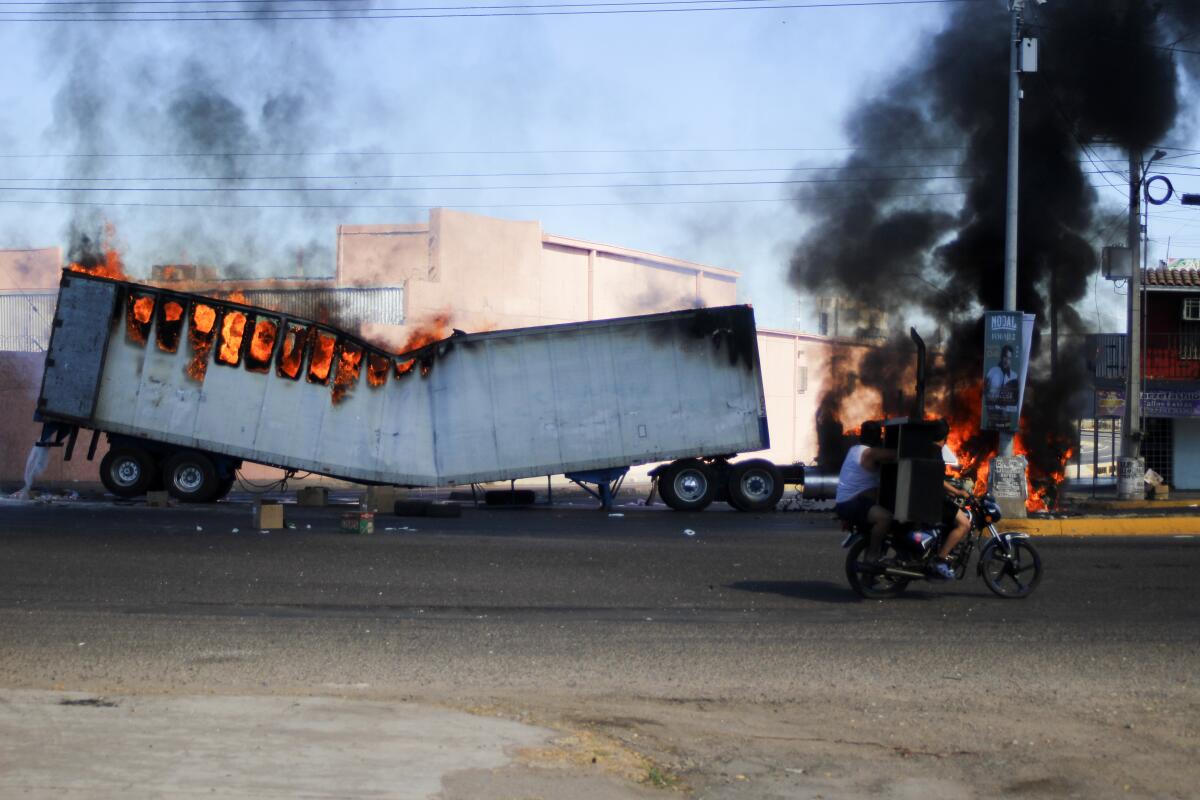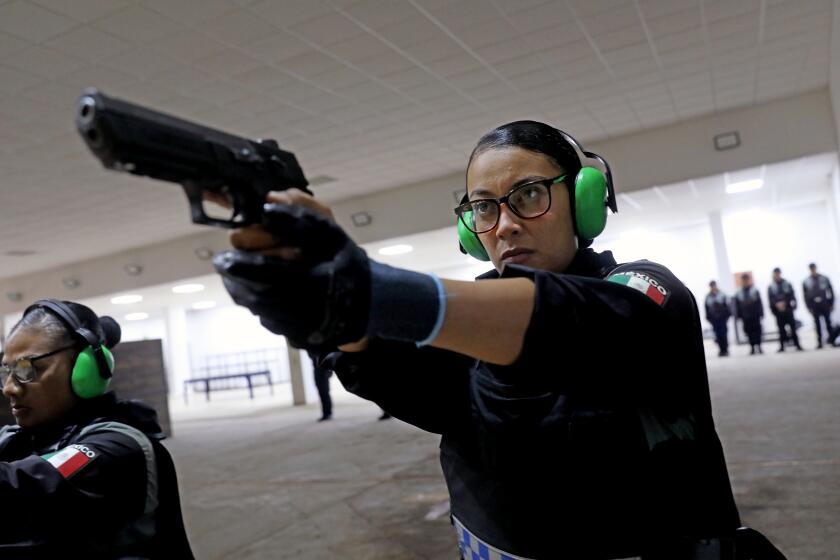U.S. official says drone flights over Mexico may signal future strikes

- Share via
WASHINGTON — In recent days, the Trump administration has ramped up CIA surveillance drone flights over Mexico, formally designated drug cartels as “foreign terrorist” groups and floated the possibility of deploying troops there to fight organized crime.
Mexico is “essentially run by the cartels,” President Trump has said, insisting that the United States should “wage war” against them.
No administration in modern times has taken such a militaristic approach to Mexico, a U.S. ally that Trump blames for producing the fentanyl that has killed hundreds of thousands of Americans. His stance upends recent U.S. policy, which emphasized beefing up the rule of law in Mexico, and stands at odds with Mexico’s security strategy, which has veered away from the sort of fierce cartel confrontations that drove record levels of bloodshed.
Mexican President Claudia Sheinbaum said Thursday that she will propose a constitutional reform aimed at protecting her nation’s sovereignty — a move that comes amid growing fears of a U.S. incursion that many believe would only spark more violence.

“The Mexican people under no circumstances will accept interventions, meddling or whatever other act from abroad that would be harmful to the integrity, independence and sovereignty of the nation,” she said, adding that that included “violations by land, sea, or air.”
Mexican President Claudia Sheinbaum has won praise for how she deals with Trump. How long can her success last?
Drones flying over Mexico today are not armed with lethal capabilities. But future strikes are a possibility, according to U.S. officials.
Todd Zimmerman, the Drug Enforcement Administration’s special agent in Mexico City, said in an interview that the administration’s decision this week to label drug cartels as terrorist organizations was a pointed message to their leadership that U.S. military action is on the table.
“They’re worried because they know the might and the strength of the U.S. military,” he said. “They know that at any time, they could be anywhere — if it comes to that, if it comes to that — they could be in a car, they could be in a house, and they could be vaporized. They’ve seen it in the Afghan and Iraq wars. So they know the potential that’s out there.”
Zimmerman said the pace of fentanyl production in Mexico has remained “relatively stable” in recent months. Still, he praised Sheinbaum for stepping up raids by the Mexican military, which he said has resulted in more drug seizures and increased pressure on the cartels.

“We’ve seen an uptick in operations since Claudia’s taken over as president here, which is a very positive sign,” Zimmerman said.
The hope, he said, is that the cartels will “step back away from fentanyl, and they’ll just go back to what they’ve always done, which is cocaine and methamphetamines and a little bit of heroin.”
Other experts pointed out that past efforts to deploy military might against drug traffickers have failed to slow the flow of drugs into the United States. When the Mexican government declared war on cartels in 2006 and sent soldiers into the streets to fight them, the clearest result was a massive increase in homicides.
“It doesn’t work,” said Elisabeth Malkin, deputy program director for Latin America at the International Crisis Group. “A whole constellation of actions are needed: to pursue proper investigations, to create cases that hold up in court, to dismantle whole networks rather than just going after the big drug kingpin, who is paraded before the cameras.”
Academic Oswaldo Zavala has pushed back at the notion that Mexico’s drug cartels are all-powerful, arguing that they could not exist without state support.
Mike Vigil, a former head of international operations at the DEA, described Trump’s efforts as “all for show.”
“The military aircraft, the troops at the border, the talk of drones: It’s all a flash in the pan,” he said. “It’s not going to have an impact.”
Using multimillion-dollar munitions to strike primitive drug laboratories would be a laughable waste of resources, Vigil said.
“You’re not talking about sophisticated laboratories. We’re talking about some tubs and pots and pans, kitchenware,” he said. “And the labs are not fixed, they’re mobile. They move them around, they’re not operational 24/7. And these labs are easily replaced. So you’re not accomplishing anything.”

Talk of drone strikes comes as other, less showy efforts to combat fentanyl have been paused because of the Trump administration’s 90-day freeze on foreign aid.
Zimmerman said that includes long-running programs to train Mexican officials to find and destroy clandestine fentanyl labs and to stop precursor chemicals from entering Mexico.
Trump’s push for a mano dura approach in the region puts him at odds with Sheinbaum, who had vowed to put more of an emphasis on crime prevention, intelligence-gathering and improving Mexico’s faulty justice system.
“We have a security strategy that will work,” she said last year. “What there will not be is a war against drugs.”
The front-runner in Mexico’s presidential election brought down crime as Mexico City mayor. Can Claudia Sheinbaum save Mexico from rampant violence?
Sheinbaum had already been forced to mobilize troops to clamp down on violence in Sinaloa state, which has been on edge since the U.S. capture of a major cartel leader in the summer. And she is under enormous pressure to show Trump that she takes his security concerns seriously in order to avoid sweeping tariffs he has threatened to impose on Mexican goods.

Last month, Trump agreed to delay tariffs after Sheinbaum said she would send 10,000 national guard troops to the U.S. border to address fentanyl and illegal immigration and establish a working group with the U.S. to combat drug trafficking.
This week, Sheinbaum described the surveillance flights as part of a “collaboration” between the two governments that had been carried out for years at Mexico’s request.
One U.S. official said the drone program was being conducted in step with the Mexican government to provide Mexico with the intelligence it needs to more rapidly deploy law enforcement against drug operations.
Aware that her own base is sensitive to U.S. meddling, Sheinbaum said that cooperation with the CIA did not violate Mexican sovereignty. She also hit back at a claim levied repeatedly by Trump in recent weeks that Mexico’s government has an “intolerable alliance” with organized crime.
“They want to position us as if we were defending drug cartels or organized crime, but of course we aren’t,” Sheinbaum said.
She has also repeatedly questioned the U.S. role in the drug trade, publicly urging Trump to do more to address drug consumption, money laundering and the flow of illegal guns to Mexico.
One idea she provided Trump on a recent phone call — to launch a media campaign in the U.S. against drug use — appears to have resonated with the president.
“That was such a great conversation, because we’re going to spend hundreds of millions of dollars advertising how bad drugs are, so that kids don’t use them, that they chew up your brain, they destroy your teeth, your skin, your everything,” Trump said this week. “And I thanked her for that.”
The only gun shop in all of Mexico is behind a fortress-like wall on a heavily guarded military base.
And despite Trump’s emphasis on militarization, U.S. officials understand that they cannot go it alone.
For years, the CIA has tracked the shipment of precursor chemicals used to produce fentanyl from China across the Pacific to clandestine labs throughout Mexico.
“Let me just tell you a little bit about how difficult it is to find a fentanyl lab here in Mexico,” Zimmerman said. “It’s extremely difficult, and the reason is because they’re very small. They’re inside houses, they’re inside apartments, they’re in backyards, under tarps.”
Drones have become a key component of efforts to find labs. But U.S. officials also have to rely on their Mexican counterparts to act quickly — before traffickers have a chance to dismantle a facility.
The formal designation of several drug cartels as global terrorist organizations is intended to give federal authorities broader powers to hit the financial networks that support the cartels, U.S. officials said.
Six Mexican cartels were among the criminal groups given new terrorist designations. Secretary of State Marco Rubio said he was making the designation because the groups pose a significant risk to the security of American citizens and the U.S. economy.
Although the cartel designations do not, from a legal perspective, facilitate a U.S. military intervention, some worry it could help build a rationale for one.
“It basically sends a message that these organizations present a threat to the United States,” Malkin said. “It lays political groundwork for some kind of military action.”
Will Freeman, a fellow for Latin America studies at the Council on Foreign Relations, said conflict between the U.S. and Mexico in recent weeks has to do with a fundamental difference in what each country wants in terms of security. Whereas Trump prioritizes the dismantling of gangs, no matter the cost, Mexico is largely interested in making communities safer, even if organized crime still holds considerable sway.
“The tension comes from the fact that many Latin American governments are focused on reducing violence,” Freeman said, “which sometimes means avoiding attacking the cartels and gangs head on.”
Wilner reported from Washington. Linthicum and McDonnell reported from Mexico City.
More to Read
Sign up for Essential California
The most important California stories and recommendations in your inbox every morning.
You may occasionally receive promotional content from the Los Angeles Times.















